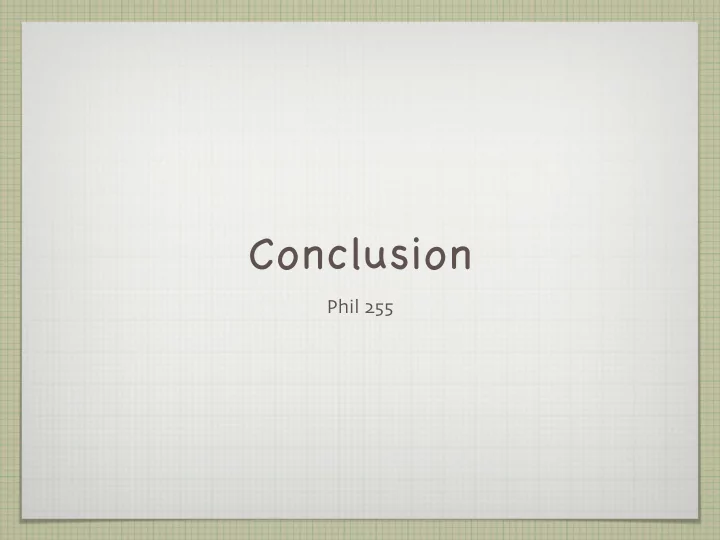

Conclusion Phil 255
In the beginning Philosophy of Mind ( PoM ), in its present form , is young Present form: highly informed by sciences of the mind Those sciences are young , especially neuroscience Neuroscience is ‘ data rich and theory poor ’ 20 th C . has been tumultuous for PoM , probably because of its changing face Lyon ’ s analyzes this change using three dichotomies: internalism / externalism monism / dualism reductionism / anti - reductionism
Internalism/externalism & monism/dualism Internal theories assume minds are ‘ in the head ’ External theories assume minds are part of the observable world Dualist theories assume mind and matter are distinct substances Monist theories assume there is one substance ( mind , matter , ? ) Introspectionism: internal ( dualist ) Behaviourism: external ( monist ) Identity theory: internal ( monist ) Functionalism: internal (‘ theoretical ’ dualist ) Lesson: monism , but how do psych . and physic . theories relate?
Reductionism/anti-reductionism Most reductionist: eliminative materialists Sort of reductionist: Dennett / Davidson: instrumentalist / normative This is in contrast to Lyons Lyons clearly misreads Dennett Doesn ’ t seem to realize explanations are for purposes Or perhaps , doesn ’ t realize he is uncritically preferring a particular kind of purpose . Makes a poor case for claim that neural reduction is ‘ useless ’
Science & scientism Lyons mistakenly equates naturalism with the view that physics is the ultimate science Fodor is a perfect counter - example ( naturalist , anti - unity ) Lyons makes more false claims: neuroscience hasn ’ t a ff ected psychology neurophysiology has had enough time to try neuro . not shedding light on beliefs , etc . shows this the most ‘ useful ’ explanations are psychological
Consciousness The problem that won ’ t go away It had for a while ( behaviourism ) Never le � in continental philosophy Nagel ( & co .) brought it back Lyons is mistaken that analytic philosophers don ’ t consider it special ( epistemologically , at least ) Lyons ’ solution is very odd Clearly , the problem won ’ t go away
Metaphysics & minds Lyons concludes by discussing Rorty Rorty claims the mind / matter distinction should go Then the mind / body problem goes two Metaphysical point is generally accepted Epistemological point is generally rejected Why not have many descriptions? What ’ s the replacement? From the metaphysical point it follows there is no ‘ essence ’ to mindfulness Lyons gives descriptive , normative , authoritative criteria Result: the category is metaphysically subjective Science: determine the ‘ kind of mind ’ and we make it ‘ real ’ or not
Question
Recommend
More recommend